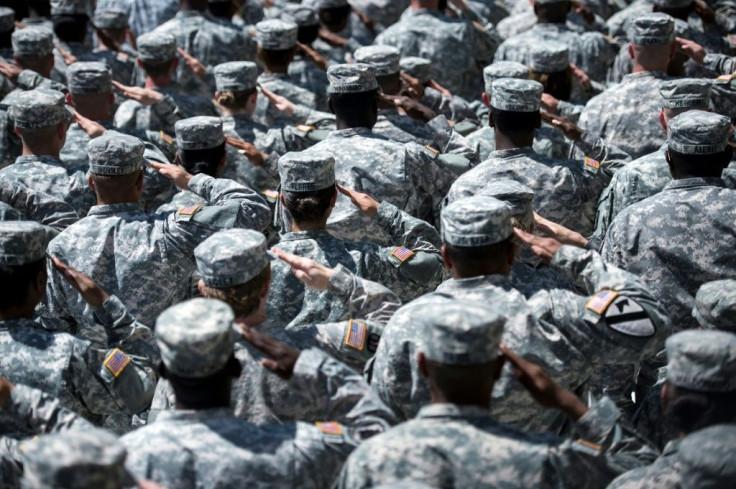Pentagon Whistleblowers Speak Out On Sexual Assault And Retaliation: 'People Are Afraid'
KEY POINTS
- An investigation by CBS has uncovered widespread reports of cover-ups and retaliation against sexual assault survivors and advocates in the military
- Sexual assault has been a problem in the military for years with the pentagon spending tens of millions on it, but these accounts suggest those investments haven't amounted to much
- A military inquiry following the deal of a military sexual assault victim at Fort Hood declared the SHARP program met Army standards despite troubling numbers
New accounts from sexual assault victims in the military and their advocates suggest that the pentagon’s inability to curb rape among their ranks is yet to be resolved. The investigation, led by CBS, says that not only does sexual assault continue to be rampant, but victims and advocates face heavy retaliation if they speak up.
This comes on the heels of the Army’s own inquiry following the death of Vanessa Guillen, a soldier allegedly murdered at Fort Hood. Her family says she was sexually assaulted but didn’t tell anyone out of fear of retribution. The Army’s report concludes its programs have “fallen short” of their goal.
The CBS report alleges that the Pentagon’s investment into advocacy and accountability programs isn’t reflected in practice. Victims often cannot receive the help they need even if they do report an assault, with the accusations investigated ad hoc by commanders instead of a true criminal investigation.
"We're talking about a crime," former advocate Marianne Bustin said. "For anyone to overlook that, not handle it appropriately, that's a crime in and of itself."

Bustin was a victims’ advocate for the Sexual Assault Prevention And Response Program, one of the programs founded with the tens of millions of dollars the pentagon is spending to trying and resolve the issue. When she reported the failings to her commander in June, Bustin was fired.
"They didn't want change, and they refused to do it, and they said, 'You're gonna be gone,' and they were right," she said.
Bustin’s not the only one. Almost two-thirds of military women victims surveyed said that they had been retaliated against when they reported it. For advocates, it makes it risky just to do their jobs.
"People are afraid," former advocate Amy Braley Franck said. "I have young ladies and men say, 'The rape was bad, but I don't wanna go through the retaliation, the treatment, the judgment because it's worse than the rape.'"
Franck reported the problems to her commanding general last year. She was suspended the very next day. Lindsey Knapp is another former advocate. She was fired in July after reporting concerns about sexual assault involving the elite Delta Force.
"It all came to a head when I reported that Delta Force was covering up rape," she said. "I don't think they want people to know that their elite fighting force is capable of doing these kinds of things."
Franck said the violations of investigation guidelines were well documented, but that made no difference in her efforts to find justice for her charges.
"I discovered written documentation of illegal investigations and victims languishing, and I continued to ask for help over and over again, and to no avail," she said.
Confronting a system like that is exhausting, especially for employees already facing daily accounts of traumatic experiences. Franck said that advocates’ inability to actually help anyone wore on her.
“I cannot look at another junior soldier sobbing and know that they've been assaulted," she said.

The real revelation from these reports is not that sexual assault is a problem in the military, but the disparity between the public image coming from the pentagon and the real actions of those in command. Officials responding to the reports repeated the same talking points they’ve given before, although a recent inquiry by the Army into operations at Fort Hood acknowledged that their efforts had fallen short, reports the Army Times.
“My preliminary review of the report, recent cases and recent media coverage, have hardened my belief that the Army’s SHARP program hasn’t achieved its mandate to eliminate sexual assaults and sexual harassment by creating a climate that respects the dignity of every member of the Army family,” said Army Secretary Ryan McCarthy on Wednesday.
That investigation was sparked by the death of Vanessa Guillen. Guillen was found dead after disappearing on April 22, and prosecutors have accused a fellow trooper of killing her. Her death sparked further outrage when her family revealed she had been sexually assaulted but not told anyone for fear of retaliation, prompting a flurry of fellow military sexual assault survivors to share their stories publicly.
Despite McCarthy’s analysis, the report itself found that the SHARP program at Fort Hood met Army standards. A full third of the women interviewed were willing to tell investigators they were sexually harassed, and the reports did not check if they had filed SHARP reports. That dichotomy has led to growing concern from lawmakers and the public.
"This topic has captivated the attention of America and our Army leaders and it is abundantly clear – we must do better," Army Secretary Ryan McCarthy on Wednesday.
The Army promises to have a new action plan by the end of December, and the Air Force reiterated the importance of advocates. They've had action plans before, dumping tens of millions of dollars on this issue. The money was spent on advocates that were apparently fired when they tried to do their job, and reports continue of commanders violating the military’s own code of justice to investigate reports themselves.
© Copyright IBTimes 2024. All rights reserved.





















